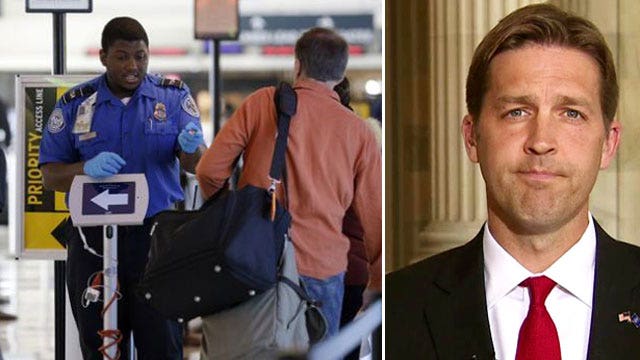Sasse wants Obama to declassify all info on TSA failures
Nebraska Republican says people need to be held accountable
This is a rush transcript from "Your World," June 8, 2015. This copy may not be in its final form and may be updated.
NEIL CAVUTO, HOST: To Nebraska Republican Senator Ben Sasse, who says you don't know the half of it. He wants the president to declassify about all the TSA's failures.
Now, Senator, you are privy to a lot of that information. And I guess you're tempted to share it. You can't right now, because it is, you know, classified. Why is it important that it be declassified? What do you think we'd glean from that, and why do you think we should learn about it?
SEN. BEN SASSE, R-NEB.: Yes, I think the president has a moral obligation to come clean with the American people about the fact that Washington is not doing its job.
Obviously, we don't want to do anything or declassify any details that would give the terrorists a road map to the particular vulnerabilities. But the problems that we face are much worse than the public understands. And I think we -- the president has an obligation to come clean and lead a national conversation about where we are in preventing terrorism, because we're not as safe as where the public is being led to believe.
CAVUTO: Well, the end result would be, if this information were to get out there -- and, again, you know it, Senator -- I don't know -- that people would be afraid to fly. And then we'd give a green light to the terrorists who knew exactly where the holes in our security sector were.
So would it be advantageous, or is it something you that guys can quietly resolve amongst the yourselves to tighten up and button up?
SASSE: Hey, the people in this city don't have a sense of urgency.
You need the public to inject a sense of urgency to this. Ultimately, we're 14 years since 9/11. We know what lots of what Washington has done in terms of spending taxpayer dollars and inconveniencing the public, the public wonders if they're real and if it's effective.
And in so many cases, it's not real and effective. But most people have been led to believe that, since 9/11, the one thing that Washington has learned is how to make sure we don't see the weaponization of an aircraft again. After last week's leaked I.G. report, it's time for the public to rethink that. This is a city that specializes in building bureaucracies, instead of setting strategies.
We need to start with a strategy and work backwards. And people need to be held accountable.
CAVUTO: You know what happens, though? The whole idea of developing Homeland Security and then TSA and all that was that agencies that were competing or ignoring each other or one-upping each other or trying to guard and shield information from each other are at it again.
And it's actually morphed into something far more dangerous, local airports, to this prior report, that don't share information or proprietary information with their federal overseers. And I'm beginning to wonder whether, no matter what you do, what you release, it comes back to a lack of communication, one side not telling the other what's going on.
SASSE: Well, there are two sides to this equation.
The first is, you're right, the lack of information-sharing inside the government is a lot of what led to 9/11 being possible. Today, we still have lots of those problems. And the people in my state, they don't want Washington to try to solve every problem, but they do want Washington to prevent terror attacks at home.
And we have not learned how to share information sufficiently inside D.C. There's not a strategic plan for this kind of information-sharing. But the bigger point is, we live in a more dangerous world than we lived in at 9/11. The public believes that Washington should have been solving a lot of these problems.
Not only has Washington not solved a enough of them. The president is not coming clean about the nature of the multi-decades and generational jihadi attacks we face. Washington needs to step up its game, and there needs to be more public pressure to make that happen.
CAVUTO: Do you think we could ever see another disaster or terror attack involving airplanes again in this country like 9/11, worse than 9/11?
SASSE: I mean, the public knows last week, the leaked report showed that 67 out of 70 times since last August, when our auditors tried to smuggle weapons and simulated explosives on the plane, they were successful.
The terrorists only need to be successful one time.
CAVUTO: All right.
SASSE: What happens when we're failing 96 percent of the time? Obviously, there's still real risk and real danger.
CAVUTO: Senator, thank you. Good seeing you.
SASSE: Thanks, Neil.
Content and Programming Copyright 2015 Fox News Network, LLC. ALL RIGHTS RESERVED. Copyright 2015 CQ-Roll Call, Inc. All materials herein are protected by United States copyright law and may not be reproduced, distributed, transmitted, displayed, published or broadcast without the prior written permission of CQ-Roll Call. You may not alter or remove any trademark, copyright or other notice from copies of the content.






















